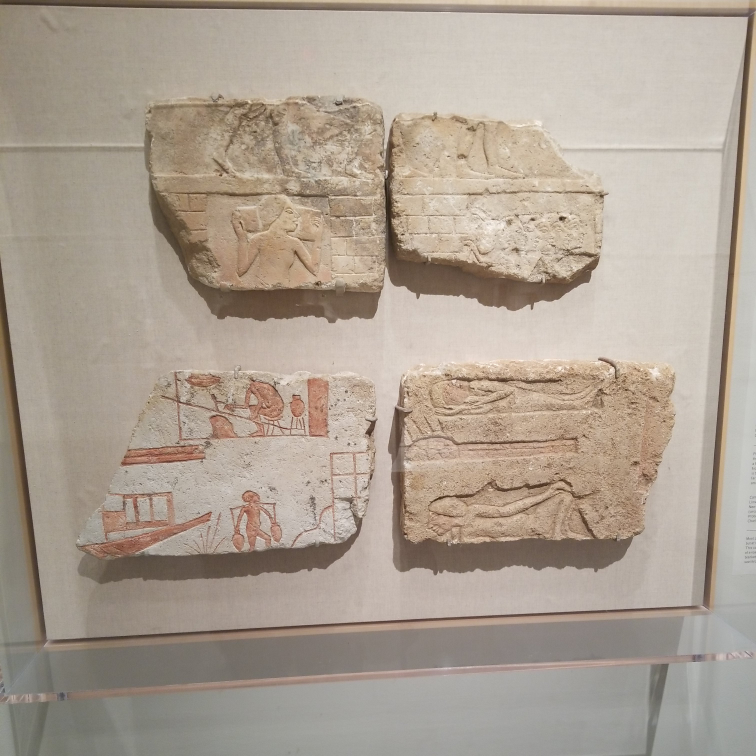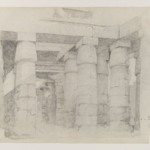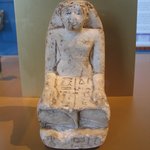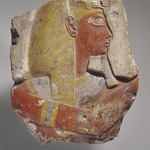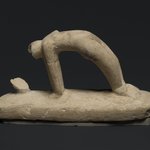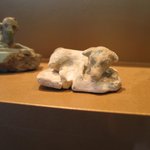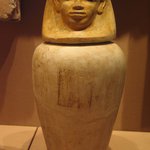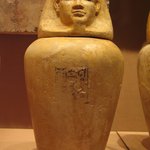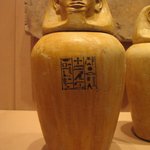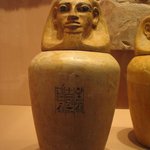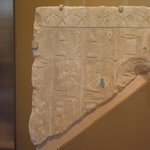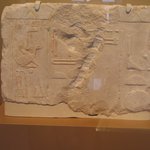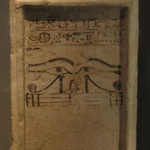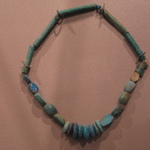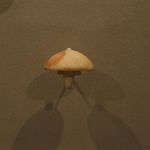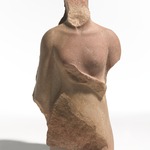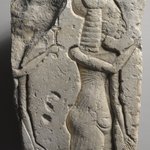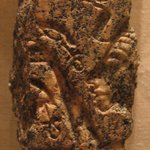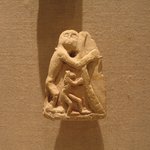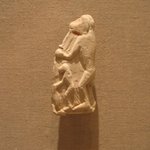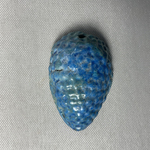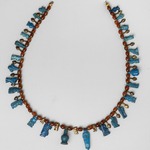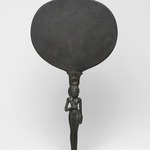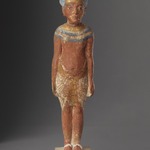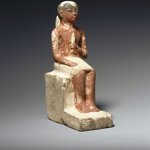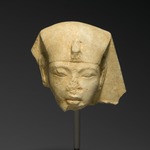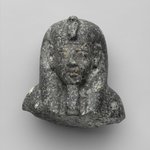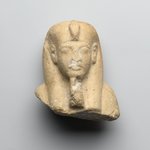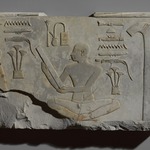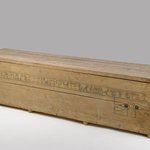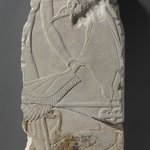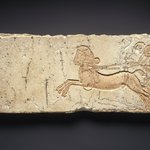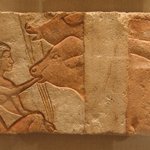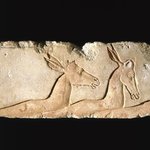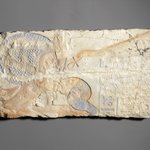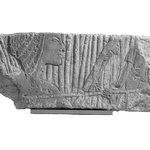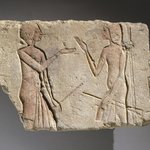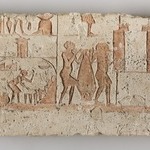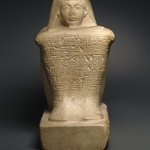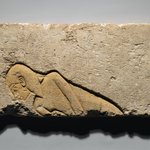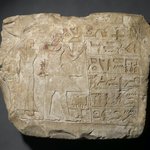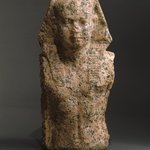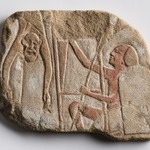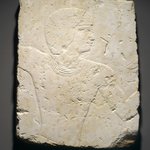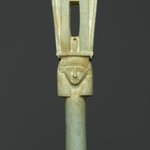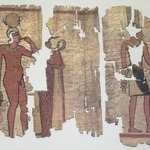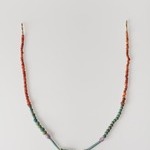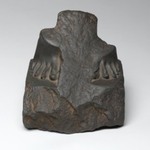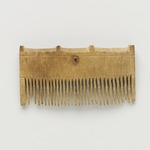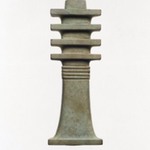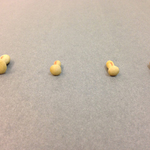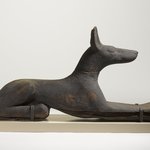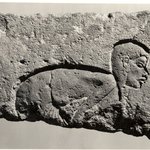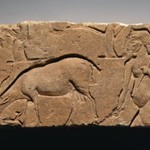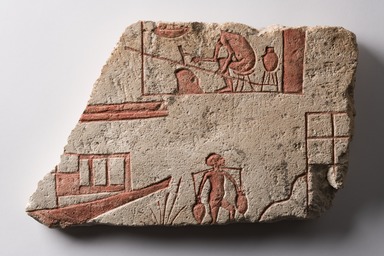
Riverside Scene
Egyptian, Classical, Ancient Near Eastern Art
Part of this boat moored along the Nile appears in the lower left corner of this relief. Next to the boat a farmer, carrying two large water jars suspended from a pole, climbs the steep riverbank. His goal is the irrigated field, arranged in square plots, at the far right. In the scene at the very top, a shipbuilder smoothes a wooden plank.
MEDIUM
Limestone, pigment
GEOGRAPHICAL LOCATIONS
- Place found: Hermopolis, Egypt
- Place made: Tell el-Amarna, Egypt
DATES
ca. 1352–1336 B.C.E.
DYNASTY
late Dynasty 18
PERIOD
New Kingdom, Amarna Period
DIMENSIONS
9 1/4 × 15 × 1 11/16 in. (23.5 × 38.1 × 4.3 cm)
mount (m1: wall mount on board): 11 3/4 × 17 1/2 × 3 in. (29.8 × 44.5 × 7.6 cm) (show scale)



COLLECTIONS
Egyptian, Classical, Ancient Near Eastern Art
ACCESSION NUMBER
65.16
CREDIT LINE
Charles Edwin Wilbour Fund
PROVENANCE
Archaeological provenance not yet documented, probably from Tell el-Amarna, Egypt; probably reused inside the pylon of Ramesses II at Hermopolis Magna, Egypt; by February 18, 1965, acquired by Mathias Komor, New York, NY; 1965, purchased from Mathias Komor by the Brooklyn Museum.
Provenance FAQ
CATALOGUE DESCRIPTION
Fragmentary limestone relief with traces of red color and part of two representations in sunk relief. Above: a man facing left, his head missing is seated on a three-legged stool in an enclosure working with an adze on a long pole; on his right a storage jar on a stand, other objects nearby. In the scene below a boat is moored at left whereas in the center some plants indicate the river back here a man, moving up an undulating hill line to the right, carries two water jars on a pole over his shoulders. One of his legs - like part of the boat - is cut off. To the right a grid indicates a field or the layout of a garden.
Condition: Good. Lower right corner and upper center of edge are badly chipped. Left side is broken off diagonally, from the bottom up inward. Entire surface uneven and somewhat pitted in places; some spotty dark brown discoloration.
EXHIBITIONS
MUSEUM LOCATION
This item is not on view
CAPTION
Riverside Scene, ca. 1352–1336 B.C.E. Limestone, pigment, 9 1/4 × 15 × 1 11/16 in. (23.5 × 38.1 × 4.3 cm). Brooklyn Museum, Charles Edwin Wilbour Fund, 65.16. Creative Commons-BY (Photo: Brooklyn Museum, 65.16_PS22.jpg)
IMAGE
overall, 65.16_PS22.jpg. Brooklyn Museum photograph, 2024
"CUR" at the beginning of an image file name means that the image was created by a curatorial staff member. These study images may be digital point-and-shoot photographs, when we don\'t yet have high-quality studio photography, or they may be scans of older negatives, slides, or photographic prints, providing historical documentation of the object.
RIGHTS STATEMENT
Creative Commons-BY
You may download and use Brooklyn Museum images of this three-dimensional work in accordance with a Creative Commons license. Fair use, as understood under the United States Copyright Act, may also apply.
Please include caption information from this page and credit the Brooklyn Museum. If you need a high resolution file, please fill out our online application form (charges apply).
For further information about copyright, we recommend resources at the United States Library of Congress, Cornell University, Copyright and Cultural Institutions: Guidelines for U.S. Libraries, Archives, and Museums, and Copyright Watch.
For more information about the Museum's rights project, including how rights types are assigned, please see our blog posts on copyright.
If you have any information regarding this work and rights to it, please contact copyright@brooklynmuseum.org.
RECORD COMPLETENESS
Not every record you will find here is complete. More information is available for some works than for others, and some entries have been updated more recently. Records are frequently reviewed and revised, and we welcome any additional information you might have.


